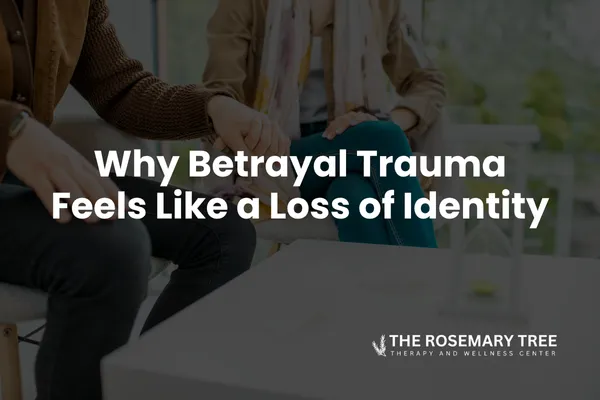
Why Betrayal Trauma Feels Like a Loss of Identity
When someone you trust betrays you, it does more than break your heart, it can dismantle the very foundation of who you are. You might ask yourself, “Who am I now?” or “How did I not see this coming?”
It is normal to feel lost after betrayal. So much of our identity is built around the relationships that anchor our lives. When those bonds are broken, it can feel like the version of yourself that existed within that relationship disappears too.
Betrayal trauma shakes your sense of safety, belonging, and even your understanding of your own judgment. It is not just about losing trust in another person; it is about losing trust in yourself.
Why Identity Feels Unstable After Betrayal
During a healthy relationship, we build shared routines, memories, and hopes. These experiences become part of our story and shape how we see ourselves.
When betrayal enters that space, it is as if the story you thought you were living suddenly changes without your consent. The timeline splits, there is the life you thought you had, and the reality you are now forced to face.
You might feel:
Confused about what was real and what was not
Unsure about your instincts or ability to make decisions
Detached from your emotions, interests, or values
Overwhelmed by questions about the future
These are not signs of weakness. They are natural responses to losing the sense of security that once helped define your identity.
The Psychological Impact of Betrayal Trauma
Betrayal trauma can disrupt your sense of self in three main ways:
Attachment Rupture: The person you relied on for love and safety becomes a source of pain. Your emotional world flips upside down.
Self-Blame: You may wonder if you “missed the signs” or somehow caused the betrayal. This erodes self-trust.
Loss of Narrative: Your life story feels interrupted, leaving you unsure how to move forward.
It is no wonder betrayal feels destabilizing, it alters the lens through which you see yourself and the world.
The Brain’s Role in Identity Loss
When betrayal occurs, your brain’s stress system goes into overdrive. The areas that regulate memory, decision-making, and emotional stability become flooded with stress hormones. You might struggle to recall details, make choices, or connect with your intuition.
This chemical storm leaves you feeling detached from your inner self. The things you once loved may no longer feel enjoyable. The values that once guided your decisions may suddenly feel blurred.
Your brain is not failing you, it is protecting you from overload. But as long as it stays in that protective state, it becomes harder to access clarity, creativity, or confidence.
Reclaiming Your Identity Through Healing
Healing begins when you give yourself permission to slow down and grieve. You are not just grieving a person, you are grieving a version of yourself that existed before the betrayal.
In our Accelerated Deep-Work Therapy Intensives, we help clients process this grief in a safe and supportive space. These multi-hour sessions allow you to stay with the work long enough to uncover what feels lost and begin rebuilding from within.
During an intensive, you will:
Identify the parts of your identity that feel uncertain or broken
Explore the beliefs that were shaken by betrayal
Learn grounding tools that reconnect you to your body and emotions
Begin rewriting your personal story with honesty and self-compassion
This process helps you separate your sense of self from the actions of others, rediscovering who you are independent of their choices.
Why Intensives Work for Identity Healing
Traditional therapy can be powerful, but when the wound runs deep, short sessions may not create enough space to process complex emotions. In an intensive, you have uninterrupted time to go deeper—emotionally, mentally, and somatically.
As your therapist guides you through layers of grief, anger, and confusion, you begin to reclaim your voice. Many clients describe a turning point where they start to remember themselves again—not the version shaped by pain, but the version grounded in truth, purpose, and peace.
Signs You Are Reconnecting with Your True Self
Healing is gradual, but you will begin to notice small shifts:
You make decisions without constant second-guessing.
Your interests and passions begin to return.
You feel grounded in your body instead of anxious.
You speak with clarity, not fear.
You can hold both pain and hope at the same time.
These are signs that you are rebuilding an identity not defined by betrayal but shaped by resilience.
How the Body and Identity Are Linked
The process of rediscovering identity is not purely emotional, it is physical too. When your body feels calm and safe, your mind can explore questions like, “What do I want?” and “Who am I becoming?”
That is why healing the nervous system is central to identity recovery. In intensives, body-based tools such as grounding, breathwork, and mindfulness help regulate your system so you can think and feel clearly again.
Your identity begins to re-form from a place of inner safety, not fear.
Rebuilding Life After Betrayal
You cannot rush this process. Reclaiming your identity takes patience, compassion, and time spent in safe connection, with yourself and with others who can hold space for your story.
Through guided support, you will start to build a new foundation, one rooted in truth and strength rather than illusion or self-blame. You will realize that betrayal did not destroy who you are, it revealed what still deserves healing.
Final Thoughts
Losing your sense of self after betrayal does not mean you are broken. It means you are human. Your identity is still there, waiting to be rediscovered and reclaimed.
If you know you need this, click here to submit an inquiry and we will get back to you right away to get the process started for you. This is an in-person service, but you can still reach out and have a conversation with us. We can talk with you and help you explore whether this next step feels right for you.


